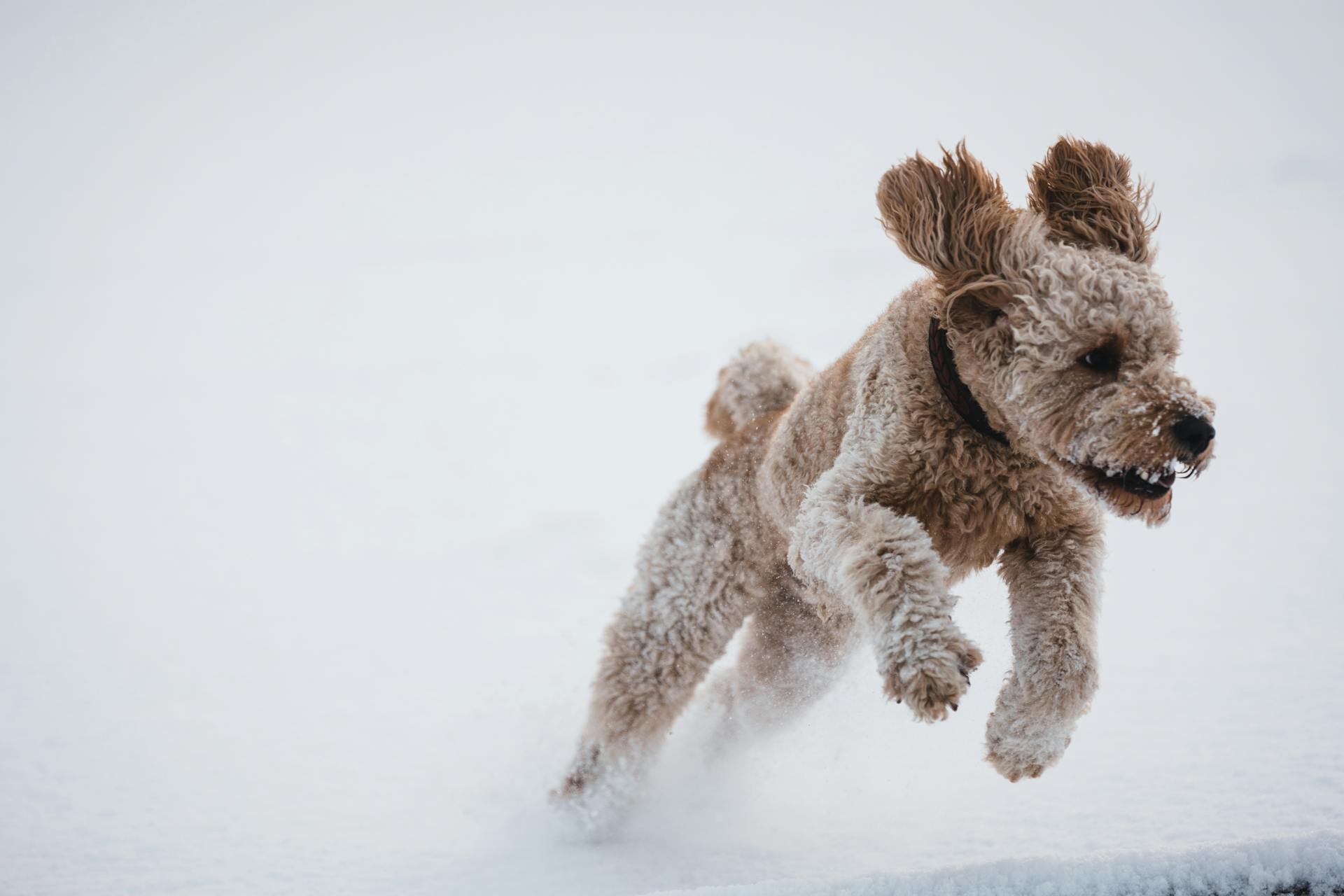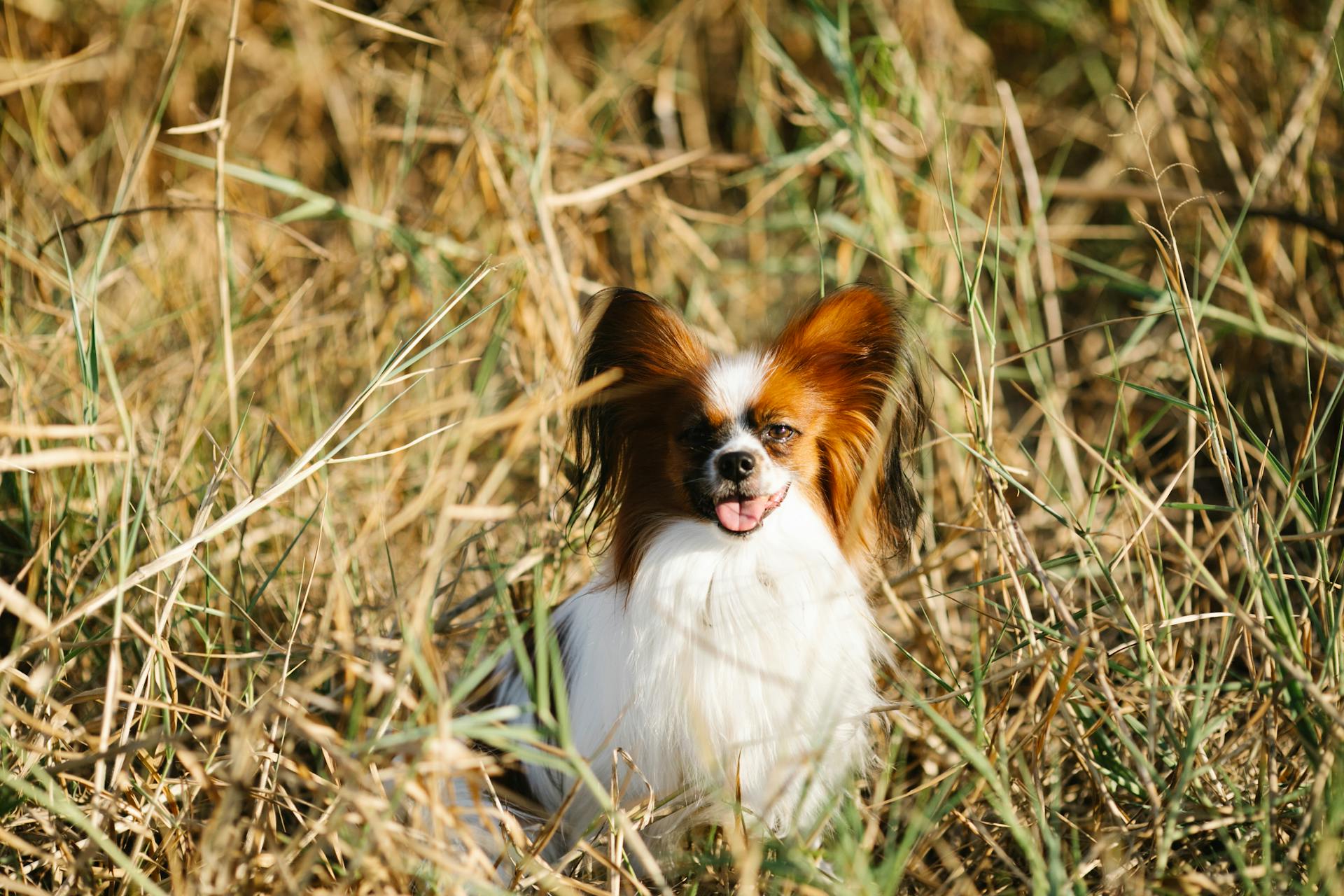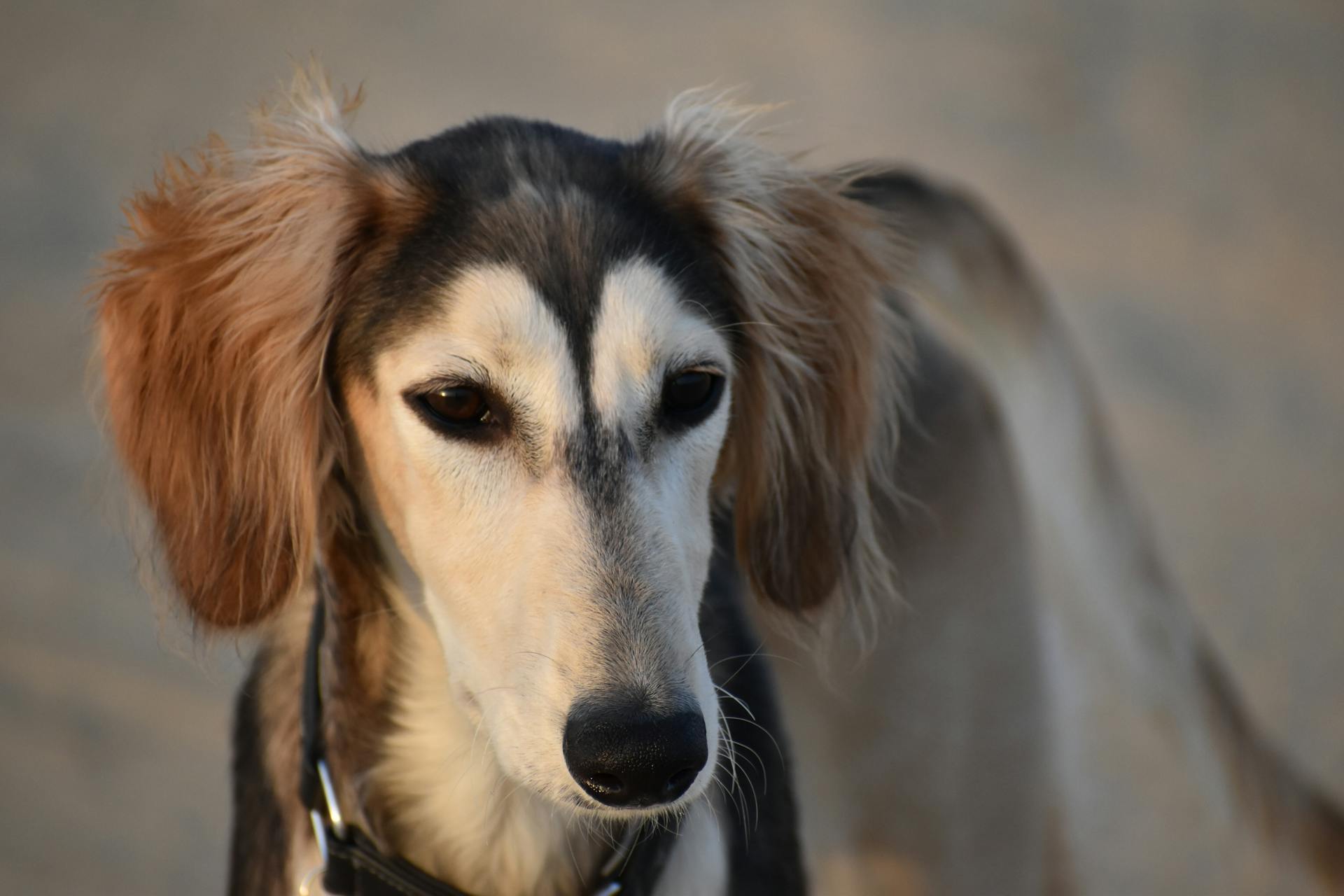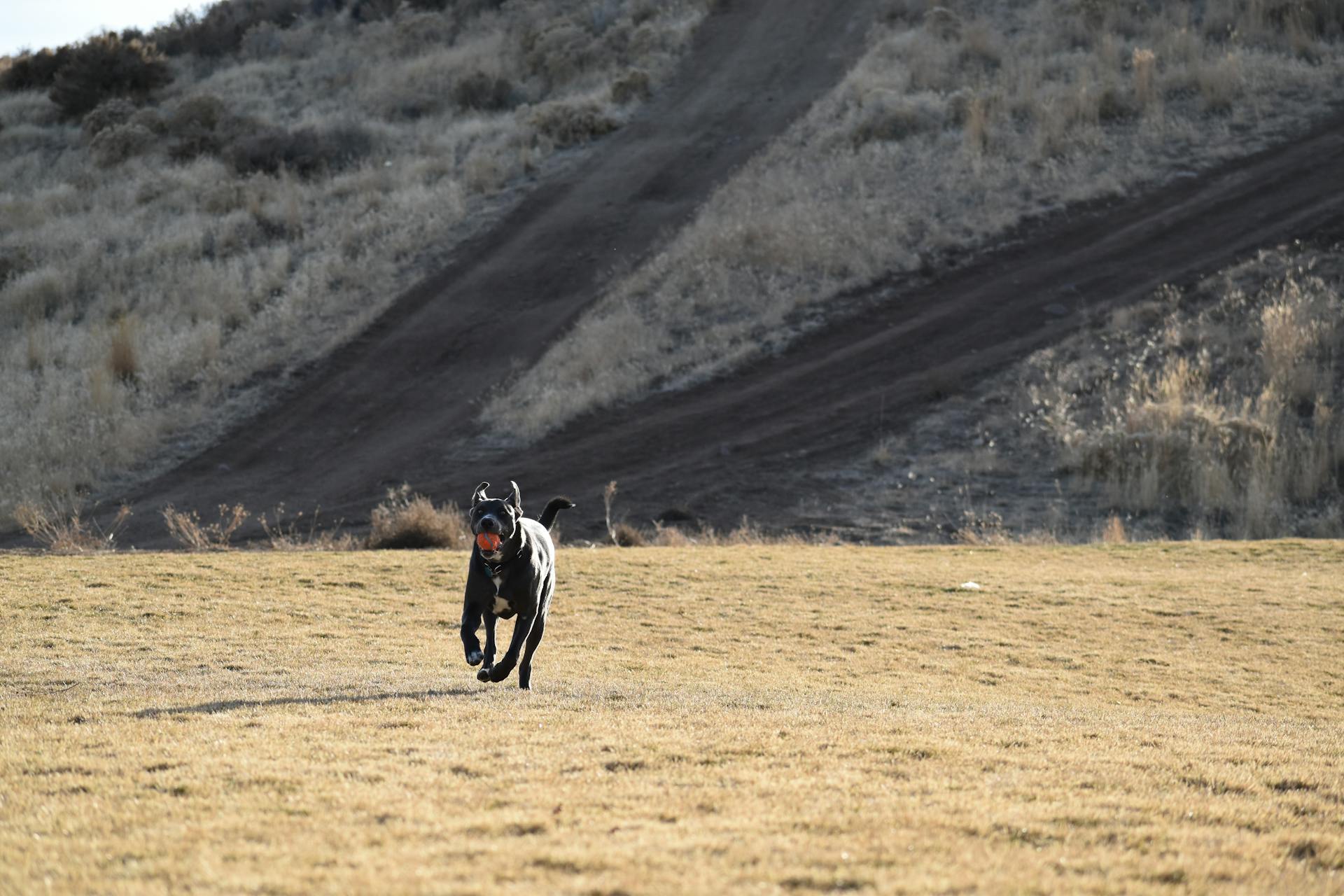
The Azawakh dog breed is a unique and ancient companion. Originating from West Africa, they have been bred by the Tuareg people for centuries.
Their athletic ability and endurance are unmatched, with some Azawakhs running up to 40 miles without rest. This is a testament to their strong physical build and robust health.
In terms of size, Azawakhs are generally lean and tall, with males reaching up to 28 inches in height. Their short coats require minimal grooming, making them a low-maintenance pet.
Azawakhs are known for their quiet and reserved nature, often described as independent and aloof.
Explore further: Dogs Breeds That Start with B
Physical Characteristics
The Azawakh's physical characteristics are truly unique, shaped by its desert environment. Its coat is short and fine, fitting tightly over the entire body.
The Azawakh's coat comes in a variety of colors, including fawn, red, brindle, sandy, white, black, blue, brown, gray, and cream.
Here's a breakdown of the Azawakh's standard colors:
In terms of size, male Azawakhs typically stand between 25 and 29 inches tall at the shoulder, while females range from 23 to 27 inches in height.
Body
The Azawakh's body is a remarkable thing, with a unique proportion that sets it apart from other breeds. Its length is about 10% shorter than its height.
The chest is well-developed in length, but not very wide, giving the breed a look of being very high on leg. The brisket doesn't quite reach the elbows.
The withers are quite prominent, and the topline is straight, either level or rising slightly to the hips. The ribs are long and visible under the skin.
The loin is short, lean, and may be slightly arched. The hip bones are distinctly protruding, and always placed as high as, or slightly higher than, the withers.
The croup is gently sloping.
Coat and Skin
The Azawakh's coat and skin are designed for their desert environment, providing protection and efficient cooling.
Their coat is short and fine, fitting tightly over their entire body, which is a key adaptation for their hot climate.
The skin is fine and tight, which helps to reduce heat loss and keep them cool.
A harsh texture or semi-long coat is unacceptable, as it would hinder their ability to regulate their body temperature.
The Azawakh's coat comes in a variety of colors, including fawn, red, brindle, sandy, white, black, blue, brown, gray, and cream.
Here are the standard colors of the Azawakh breed:
The Azawakh's stomach area may be hairless, which is a unique characteristic of this breed.
Coat and Grooming
The Azawakh's coat is one of its most distinctive features, with a short and fine texture that fits tightly over its entire body. This sleek covering provides excellent protection against the intense heat of its desert environment.
Azawakhs come in a wide range of colors, including fawn, red, brindle, sandy, white, black, blue, brown, gray, and cream. Their stomach area may be hairless. They can also have various markings, such as white markings, a black mask, piebald, brindle markings, grizzle markings, and parti-color.
Regular shampooing is not required, but occasional baths are recommended, especially if your Azawakh gets dirty or develops a strong odor. It's best to use a mild, hypoallergenic shampoo since Azawakhs tend to have sensitive skin.
Weekly nail, ear, and teeth checks are essential to maintaining your Azawakh's overall health. Their nails should be trimmed regularly, their ears should be cleaned and checked for any signs of infection, and their teeth should be brushed to prevent tartar buildup.
Here's a list of standard colors and markings for Azawakhs:
Azawakhs do shed, but their shedding is minimal compared to many other breeds. Regular brushing can help to manage the shedding and keep their coat looking its best.
Personality and Temperament
The Azawakh's personality is a unique blend of dignity, independence, and loyalty. They can appear reserved or standoffish to strangers, but with their families, they are deeply affectionate and protective.
Azawakhs are naturally wary of strangers, which can make them excellent watchdogs. They have a keen alertness and watchful nature, always ready to defend their loved ones and property if necessary.
As sighthounds, Azawakhs have an innate instinct to chase moving objects, including small animals, bicycles, or even running children. This can be a challenge for owners, especially in areas with small pets or children.
Personality and Temperament
Azawakhs are a unique breed known for their dignified and independent personalities. They can appear reserved or standoffish towards strangers, but are deeply loyal and affectionate with their families.
Their aloofness doesn't mean they're aggressive by nature; they prefer to avoid conflicts if possible. However, they're highly protective of their loved ones and will defend them if they sense a threat.
As sighthounds, Azawakhs have an innate instinct to chase moving objects, including small animals, bicycles, or even running children. Their swift and agile nature makes them excellent at activities like lure coursing and agility.
Azawakhs are pack-oriented and form complex social hierarchies. They have tremendous memories and can recognize each other after long periods of separation.
Their intelligence demands consistent training and a handler who understands their sensitive nature. Early and consistent socialization is crucial to help them become more at ease in various social situations.
Azawakhs are highly energetic and have tremendous endurance, making them excellent training companions for runners. Many dislike rain and cold weather, so they prefer to stay indoors on rainy days.
Do Dogs Bark?
Azawakhs are generally quiet dogs and don’t make excessive vocalizations. They're likely to bark if there's a specific reason, such as if they're alarmed by an intruder.
Diet and Nutrition
The Azawakh's diet and nutrition play a crucial role in maintaining their overall health and energy levels. This breed requires a balanced diet that caters to their high energy needs.
To ensure your Azawakh gets the nutrients they need, choose a premium-quality dog food that is specially formulated for medium to large-sized breeds. Look for a food that contains a good balance of protein, fats, and carbohydrates.
Feeding your Azawakh requires attention to their nutritional needs and activity level. The amount of food they need depends on factors such as age, size, activity level, and metabolism.
Establish a consistent feeding schedule with two meals a day for adult Azawakhs. Puppies may require more frequent meals. Avoid leaving food out all day, as it can lead to overeating and weight gain.
Consider reading: National American Eskimo Day
Providing fresh, clean water is essential for your Azawakh. Proper hydration is vital, especially for active dogs. Monitor your Azawakh's weight and body condition regularly to maintain a healthy weight.
Some Azawakhs may have sensitive stomachs or food allergies. If you notice any digestive issues or food intolerances, consult with your veterinarian to find the best diet for your dog.
Here's a summary of the Azawakh's feeding guidelines:
Care and Maintenance
Azawakhs are intelligent, affectionate, and loyal dogs, but they can be independent in spirit, making them a challenge for novice owners.
They require a lot of additional training due to their unique personalities.
Azawakhs have a high prey drive, which means they can be triggered to chase small animals, so careful introductions are necessary when introducing them to cats.
Their sensitive nature means they thrive in a calm and stable environment, where they can feel secure.
Regular routines and daily exercise are essential to help them feel secure and comfortable.
In colder climates, Azawakhs need protective clothing when outdoors, and in hot and humid weather, early morning or late evening outings are best.
Their territorial nature might surface when meeting other dogs for the first time, so proper introductions are needed.
Despite their reserved nature around strangers, Azawakhs are gentle and affectionate with children they know well.
They're relatively low maintenance in terms of grooming, with a short coat that's easy to care for.
However, they require regular exercise and plenty of mental stimulation to keep them happy and healthy.
Expand your knowledge: When Can You Mate a Female Dog
Breed Information
The Azawakh breed has its roots in the Sahel region of Africa, where it was bred by nomadic tribes as a hunting and guard dog, as well as a loyal companion. The breed's athleticism, intelligence, and independent nature make it a unique and valuable companion.
The Azawakh's appearance is characterized by its tall and lanky build, with a range of colors including fawn, brindle, and black. Its exceptional agility and speed make it well-suited for hunting small game, and its keen senses prove invaluable in the sparse terrain of its homelands.
Expand your knowledge: Azawakh Puppy
Here are some key breed standards recognized by major kennel clubs:
The Azawakh's rich history is deeply intertwined with that of the Tuareg people, who have selectively bred the breed for centuries to emphasize its hunting and guarding abilities.
Breed Info Characteristics
The Azawakh breed has a rich history that spans centuries, originating from the Sahara Desert in West Africa. They were bred by the nomadic Tuareg people to serve as both hunting dogs and loyal guardians for their herds and families.
The Azawakh's exceptional agility and keen sense of sight made them valuable assets in hunting swift prey across the vast desert landscape. Their watchful and protective nature ensured the safety of their owner's livestock and families.
The breed's name comes from the Azawagh Valley, which lies in the desert between Mali and Niger. The Azawakh's coat is short and fine, fitting tightly over the entire body, providing unequalled protection against the intense heat of its desert environment.
A fresh viewpoint: Fat Azawakh
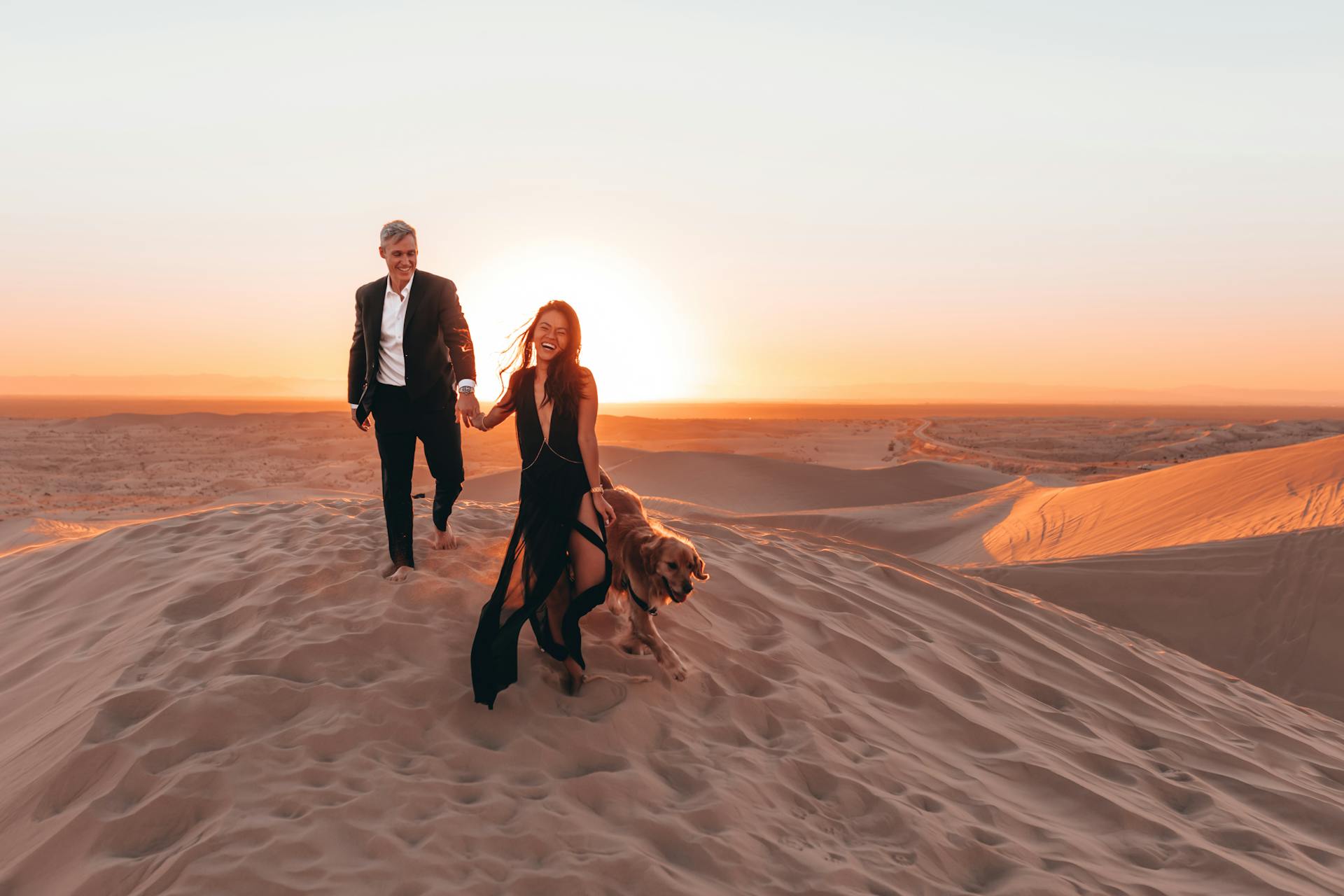
The Azawakh is a sighthound native to the Sahel region of Africa, known for its athleticism, intelligence, and independent nature. They are recognized by the world's leading registries and kennel organizations, which categorize the breed into a specific Group based on its unique characteristics.
Here are some key characteristics of the Azawakh breed:
The Azawakh is an excellent hunting dog, traditionally used to hunt gazelle and other fleet-footed prey in the desert. They are also known to be protective of their territory and humans, but can vary in their reaction to strangers.
Meet Doug Koger - Domiko Breeder
Doug Koger is the breeder behind Domiko Azawakh, a passion project that has taken him on a remarkable journey.
Doug's journey in breeding Azawakh dogs is one of dedication and love for the breed.
He has a deep passion for the Azawakh breed, which is evident in his work as a breeder.
The dog show community is a key part of Doug's life, and he has gained valuable insights from his experiences within it.
Related reading: Azawakh Colors
Lilia Berezkina | Ayur-es-Sahel
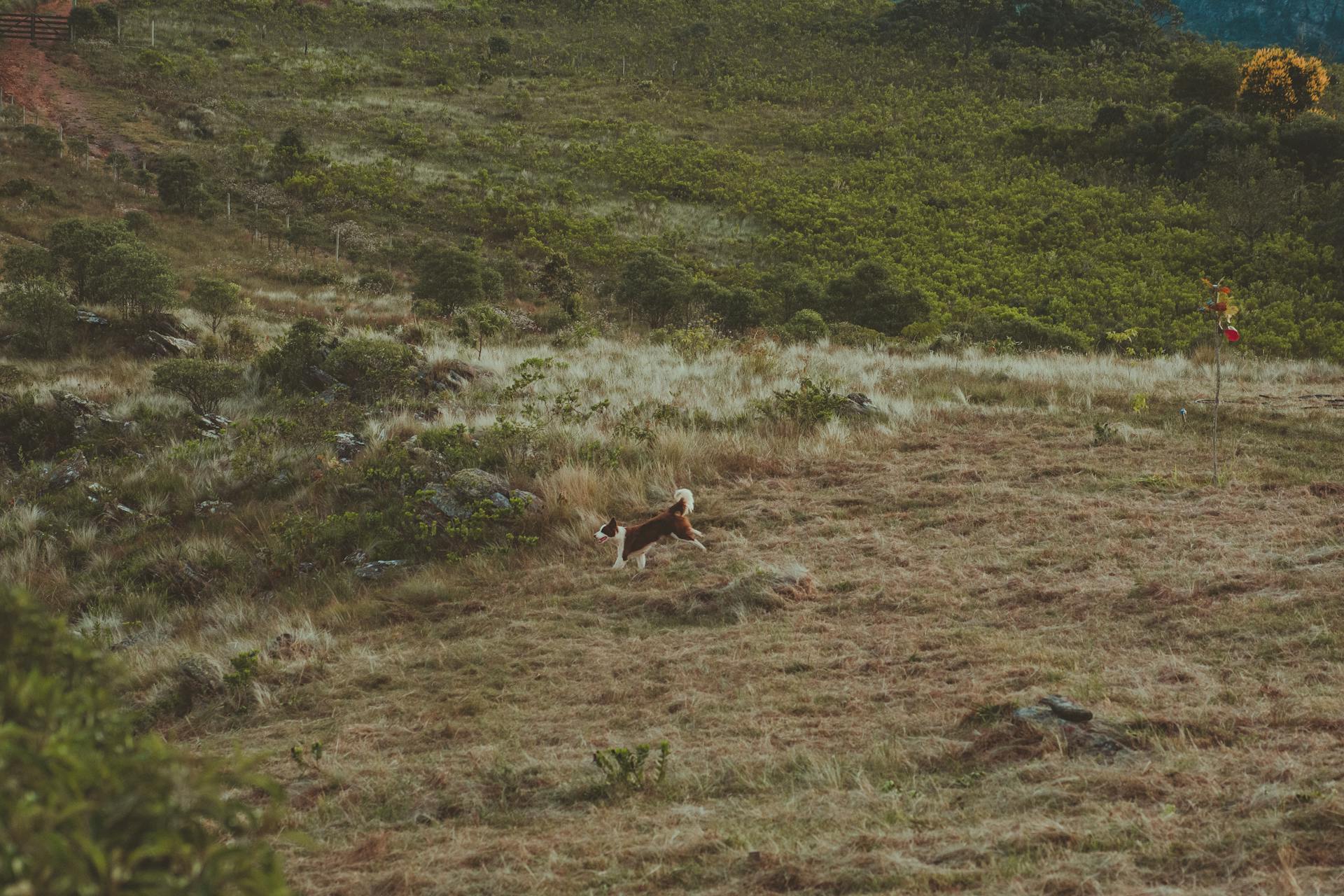
Lilia Berezkina is the breeder behind Ayur-es-Sahel Azawakh. She's the driving force behind the kennel's success.
The kennel's beginnings are rooted in Lilia's passion for the Azawakh breed. Ayur-es-Sahel Azawakh is a reputable kennel with a strong foundation.
Lilia has carefully selected sires and dams to create a bloodline that showcases the breed's unique characteristics.
You might like: American Kennel Club Lancashire Heeler
Kel Imajaghan | Aliya Taylor
Aliya Taylor is an expert in the Azawakh dog breed, having had a chance to interview her about her interests and experiences. She's had the opportunity to learn about this ancient breed through her conversations with owners and breeders.
Aliya's introduction to the Azawakh breed was a fascinating one, as she shares in her interview. She's since had the chance to attend dog shows and meet many Azawakhs in person.
The Azawakh dog breed is known for its striking appearance, with a lean and athletic build. Its short, smooth coat comes in a variety of colors, including fawn, brindle, and black.
Frequently Asked Questions
Why are Azawakhs so expensive?
Azawakhs are expensive due to their rarity and high breeder reputation, with prices ranging from $2,000 to $3,000. Their unique characteristics and needs also contribute to their premium cost.
Do Azawakh dogs bark?
Yes, Azawakh dogs are known to bark as part of their guarding instincts to alert and monitor their surroundings.
Are Azawakh good for first time owners?
Azawakh may not be the best fit for first-time owners due to their independent nature and need for extra training. Experienced owners who can provide the necessary attention and guidance may find them a rewarding companion.
Are Azawakh dogs good pets?
Azawakh dogs are intelligent, loyal, and affectionate companions, but they can be challenging for novice owners due to their independent nature and unique personalities. With proper training and experience, they can make wonderful pets for the right owner.
Why are Azawakh dog so skinny?
Azawakh dogs are naturally lean due to their slender, rectangular body shape, which allows their skeleton and muscles to be visible under their smooth skin. This is a characteristic of the breed, not a sign of malnutrition.
Featured Images: pexels.com
